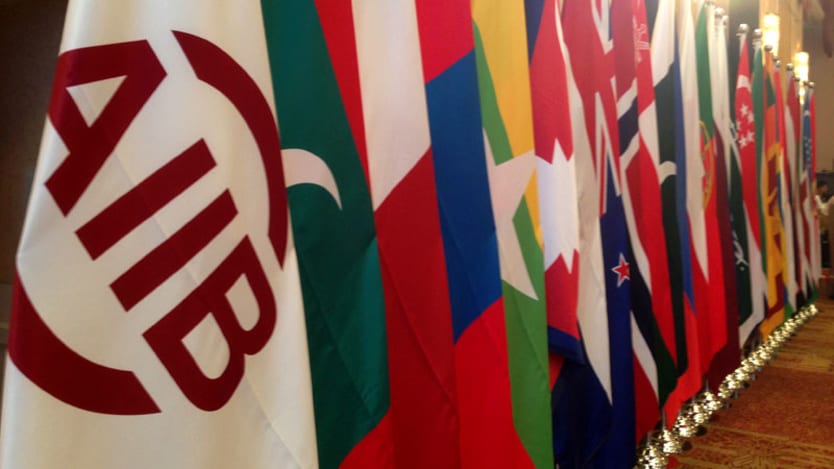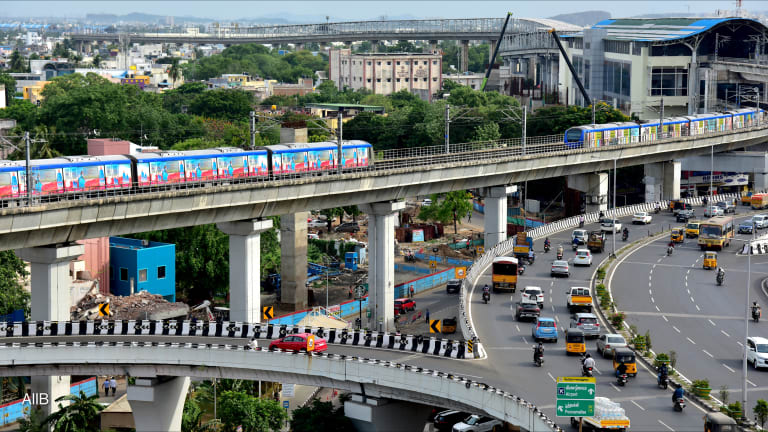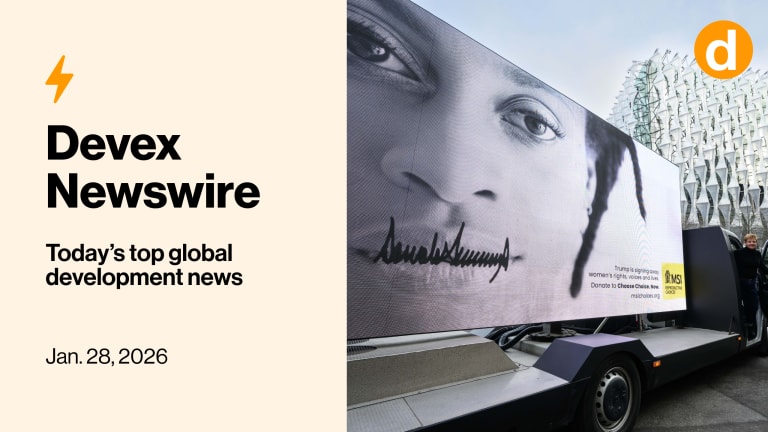
MUMBAI, India — Despite the lack of a targeted gender policy, the Asian Infrastructure Investment Bank hasn’t been ignoring gender in its work, the bank’s principal social specialist Michaela Bergman told Devex at the AIIB’s third annual meeting in Mumbai this week.
The China-backed bank, which has approved more than $4 billion in loans for infrastructure projects since it began operations in January 2016, is taking the time to think about how it can “add value, be effective, efficient, and actually make a difference in the end,” Bergman said. “What you want to do is make a difference to women or men on the ground — or both — and [think about] how can we do that with our limited resources.”
See more topics:
► AIIB to create corporate culture of 'openness and candor,' bank chief says
► Civil society sounds alarm on AIIB's latest 'hands-off' lending deal
Between now and 2030, Asia’s investment in infrastructure must rise to $2 trillion a year, or roughly triple what it has been in the past, AIIB President Jin Liqun said in his address at the meeting. It is both an opportunity and a challenge, considering the way infrastructure is designed, constructed, and managed can have the potential to increase, maintain, or reduce gender gaps.
Rohini Pande, professor of international political economy at Harvard Kennedy School, encouraged the bank to consider “invisible infrastructure,” or the social structures that shape how physical infrastructure actually functions for women, in all of its work. Taking women’s daily travel patterns into account when designing a project, or recognizing and addressing the disproportionate impact that lack of water and wastewater infrastructure places on women, can have life-altering impacts on their livelihoods and communities, she said.
Throughout the annual meeting, several high-level bank officials, including President Jin, pointed to AIIB’s rural roads projects in India as an example of progress. In the country’s westernmost state of Gujarat, a $329-million loan is meant to support the improvement of rural roads for 1,060 villages.
“Connectivity is essential for accessing health and education and for participating in the market economy,” Jin said. “These roads will benefit 8 million people, of whom one-sixth are below the poverty line.”
But Pande referenced the same project, which claims that roughly 46 percent of individuals who will benefit are female, to show that all of these benefits may not actually be shared by women: “The main returns from rural roads is not that jobs go flooding into villages, but rather it lets people move to where jobs are. And these people tend to largely be men.”
When rural roads open, men are more likely to migrate, while women often remain constrained by needing permission to pursue employment outside of their villages, she added.
As part of its learning process, AIIB invited Pande, along with several other experts, to speak on a gender and infrastructure panel at the bank’s annual meeting in India. Also present was Andrew Morrison, chief of gender and diversity at the Inter-American Development Bank, which has established itself as a leader in the space by actively pursuing gender equality within its walls and in its project implementation.
The IDB created its Gender and Diversity Division in 2007 to mainstream gender and diversity throughout their loans, technical assistance grants, and country programs, and a 2017-2019 Gender Action Plan currently governs how the bank approaches mainstreaming gender through their operational business.
"If we want to promote gender equality in society, especially for multilateral development banks, we need to take advantage of infrastructure because infrastructure lending represents a significant percentage of the lending that multilateral development banks do," Morrison told the audience during the panel.
AIIB’s approach to gender will likely look very different from IDB’s, considering the gender diversity division at the Latin America-focused bank counts about 30 full-time staff.
“That’s not a reasonable scale for AIIB with 200 full-time staff versus 2,000 full staff [at IDB], and you need to be creative,” Morrison told Devex. “I think AIIB is being thoughtful about how to do this … I think they have a high probability of success, but they’re going to need to define their processes, their metrics, and how they measure success in ways that makes sense for their mission.”
One thing he doesn’t recommend AIIB — or any institution — do is to rely on checklists or sector toolkits to make sure gender is integrated into project design. Checklists tend to be written by gender specialists who may or may not have deep knowledge of the sector, and the water or energy specialist ultimately preparing the project tend not to look at them anyway, he noted.
At the top of his list to encourage more gender equality interventions in infrastructure would be management commitment, as well as technical assistance to project teams so they have gender experts they can call on when needed. It’s not as cheap as a checklist, he said, “but it’s a whole lot more effective.”
“One of the most gratifying things for me as the chief of a gender and diversity division at a development bank is to watch my infrastructure colleagues get passionate about promoting gender equality,” Morrison added. “And they’re getting passionate about it because they’ve come to the realization it’s going to help them do better projects.”
This is the kind of culture AIIB’s Bergman hopes to help establish at the bank, although it’s still very early days and practices are changing rapidly as the staff grows, she said. In the meantime, she is already considering how AIIB’s projects impact both women and men.
“You don’t have to have a gender policy to look at gender,” Bergman said. “Within the environmental and social framework, there’s enough requirements to look at differentiated impacts.”
In the future, Bergman would like to establish priority sectors and countries for increased gender impact, examining both access to infrastructure as well as employment opportunities for women in nontraditional sectors like transport and construction. For now, “we already have a structure, it’s just not a gender policy, and that’s what we’ll build upon,” she said.








